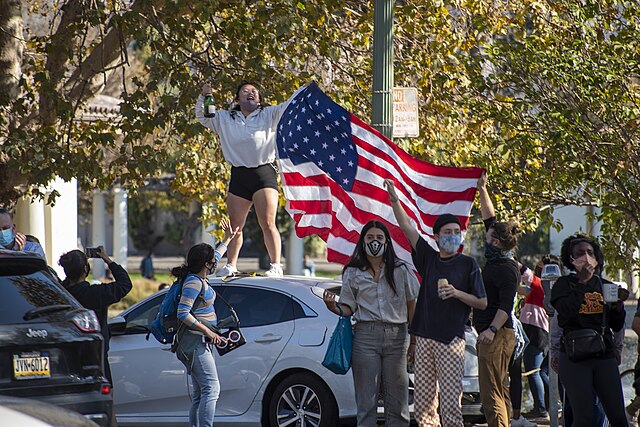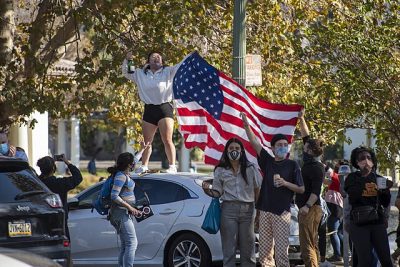The consequences of the 2024 US presidential election will be felt from Washington, DC to Warsaw, Illinois. But they will also be felt in Warsaw, Poland.
The United States is, despite the many pronouncements of its decline, powerful and influential enough for its presidential election result to be felt around the world. Central and Eastern Europe is no exception to this. It is, in fact, a region where this is perhaps particularly true.
The first and most obvious way in which the 2024 presidential election will matter for Central and Eastern Europe is Russia’s war in Ukraine. The Democratic candidate, Vice President Kamala Harris, has essentially said she would continue US President Joe Biden’s policy. She is committed to continuing to provide assistance to Ukraine. The Republican candidate, former US President Donald Trump, has, by comparison, repeatedly questioned US aid to Ukraine, and derided Ukrainian President Volodymyr Zelenskyy as a “salesman” who “walks away” with billions every time he comes to the United States.
Much has been made of Trump’s stated fondness for Russian president Vladimir Putin, but just as salient was the reason for Trump’s first impeachment: he was accused of trying to extort Zelensky by using the carrot of lethal aid to entice his Ukrainian counterpart to open an investigation into his political rival, Biden.
We should expect Trump’s skepticism for NATO to carry into a second term, too. (Harris, in the debate with Trump, warned that if Putin is able to take Kyiv, “Putin would be sitting in Kyiv with his eyes on the rest of Europe. Starting with Poland. And why don’t you tell the 800,000 Polish Americans right here in Pennsylvania how quickly you would give up for the sake of favor and what you think is a friendship with what is known to be a dictator who would eat you for lunch?”)
More broadly, Harris’s record as a senator and as vice president suggests that she would view the countries in the region as allies. She would likely continue to offer some support to those trying to, for example, protect minority rights or advocate for democratic norms in the region.
Trump would be more disruptive. For one thing, Trump is campaigning on the most aggressive tariffs — taxes on imported goods — in almost 100 years, and is, per the Washington Post, “preparing an attack on the international trade order that would probably raise prices, hurt the stock market and spark economic feuds with much of the world.” The new tariffs would likely hurt global trade and financial flows between Europe and the United States. The European Union and the United States could very well find themselves in a trade war, the losers of which would likely be American and European businesses and consumers.
And Trump’s potential changes to immigration could impact families from Central and Eastern Europe, too: he’s proposing making it more difficult for family-based migration and has, in the past, tried to slash not only undocumented, but also legal migration. (Trump has also complained that the United States needs more migration from certain countries, which he has deemed “nice,” like “Denmark” and “Switzerland.”)
When I think about what another Trump term would mean for Central and Eastern Europe, though, the thing I think about the most are outlets like this one. Journalism is under pressure from governments across the region. That is, in my view, something that US leadership has a responsibility to push back on. When you claim to be allies based on shared democratic values, all parties involved should try to push each other to actually uphold those values. I do not think that we can expect this under Trump, who called the press the “enemy of the people” and “just bad people” at a rally in Arizona last week. His first term was marked by attacks on journalists, and particularly women journalists. I think it will be worse for journalists here in the United States and in Central and Eastern Europe, too.
And I think that we can extend this to those who speak up for democratic norms and minorities more generally, like already maligned NGO workers and activists. For example, in 2022 USAID announced that it was “supporting new locally-driven initiatives in Central Europe with the goal of strengthening democratic institutions, civil society, and independent media, which are all pillars of resilient democratic societies.” It is unclear to me that that support would continue in a Trump administration. (This is separate from development assistance to Europe and Eurasia region; Trump made dramatic cuts to foreign assistance the last time he was in office.)
Trump, in his debate with Harris, said, in response to the charge that world leaders were laughing at Trump, that Hungarian Prime Minister Viktor Orban likes him. “Look, Viktor Orbán said it. He said, ‘The most respected, the most feared person is Donald Trump. We had no problems when Trump was president.’” And it is true that Orbán received less criticism from the United States when Trump was president. But whether that is good for Americans and Hungarians is another matter entirely.
Having a president who believes in freedom of the press isn’t enough, of course, to magically make conditions for journalists better. Having a president who believes in liberal democracy in theory doesn’t mean that all its values are always practiced, or that democratic norms in Central and Eastern Europe will be respected. But not having one is enough to make things worse. And, in a way, the same could be said of Harris and Trump’s respective victories for Central and Eastern Europe more generally: On questions ranging from national security to democracy, she won’t magically make everything better, but he can quite quickly make matters worse.
Subscribe to “Goulash”, our newsletter with original scoops and the best investigative journalism from Central Europe, written by Szabolcs Panyi. Get it in your inbox every second Thursday!
Emily Tamkin is a global affairs journalist and author of The Influence of Soros and Bad Jews. Her work has appeared in the New Republic, the New York Times, Slate, and the Washington Post, among other publications, and previously covered foreign affairs and US policy on staff at Foreign Policy, BuzzFeed News, and the New Statesman. She was a recipient of a Heinrich Böell fellow in 2017 and a Shalom Hartman Writers and Journalists fellow in 2021-2022. She provides English language editing for VSquare and is based in Washington, DC.






